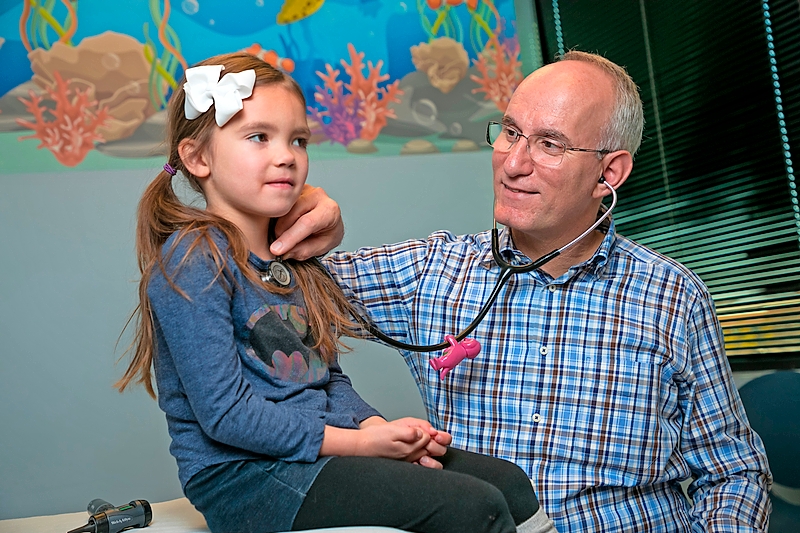Minor League
By Kathy Aabram
Appears in the January 2018 issue.

With his calm, reassuring voice and his thoughtful answers, it’s easy to picture Dr. Gus Rousonelos comforting a sick child and an anxious parent. This is what you would expect from a pediatrician with 30 years’ experience. Born and raised in Joliet, then Plainfield, Dr. Gus—as children and parents call him—has seen a lot over his three decades in practice. Being the second oldest in a family of eight children, he had a lot of experience helping younger siblings, which began his interest in working with kids. His medical rotation through pediatrics solidified his decision to spend his career treating children. After graduating from medical school at University of Illinois and serving as Chairman of Pediatrics at Good Samaritan Hospital, Dr. Gus opened his practice, Naperville’s ABC Pediatrics, in 1994.
What has been the largest shift you’ve seen in the health of children over your career?
The biggest change I have seen is a decrease in serious bacterial infections due to new vaccines. In school, we spent a lot of time studying and treating serious infectious diseases and very little time on psychosocial issues like developmental delays, anxiety and depression. Now I spend a great deal of my professional time working on psychosocial issues. Having fewer children harmed by diseases, and having more time to help families deal with psychosocial issues, is a huge improvement for the quality of life of children.
What hasn’t changed?
The importance of the pediatrician’s long-term relationship to the patients and their parents. As pediatricians, we get to know our families very well. When problems arise, we are in the best position to help families work out difficult issues. We strive to make our practice a medical home—a familiar, accepting and reassuring place for our families. I’m honored that my grown patients are now bringing their babies to us.
What do parents worry about that they shouldn’t?
All parents worry that their kids don’t eat their vegetables. I remind parents that they probably eat a lot more vegetables as an adult than they did as a child. The job of the parent is to serve lots of fruits and veggies and the job of the child is to eat them when they’re ready—usually in the teen years.
Parents also worry about their children’s mistakes or failures. wParents need to see mistakes as a normal part
of learning. When we try something new, it’s normal to fail a few times before succeeding.
If we’re not failing, we’re not challenging ourselves enough. Parents should give children encouragement when they fail and praise for the effort when kids try a difficult task. When they succeed, give them a high five—not for the success, but for the grit and tenacity it took to succeed. Our goal is that they become fearless lifelong learners.
What is one thing you really want parents to know?
I really want parents to help their children develop healthy habits. My well visits are based on encouraging healthy daily routines for nutrition, exercise, sleep, brushing teeth, age appropriate chores and safety habits to reduce preventable injuries. At the annual visits I speak directly to the kids in a question-and-answer format about each of these topics. As they get older, I give more information and emphasize that it is up to each of us to commit to these daily routines to keep us happy, healthy and productive for the rest of our lives.
ABC Pediatrics
Dr. Gus Rousonelos, Dr. Erin Shanks, Dr. Karolyn Law, Dr. Ushma Patel, Dr. Pamela Persak and PA Colleen Kirr
1331 West 75th Street, Suite 300, Naperville
630.355.0003, abcpediatrics.net


